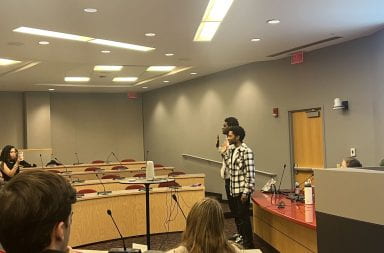The Board of Trustees will be voting on a 6 percent tuition increase for students on the Columbus campus next month said William Shkurti, senior vice president for business and finance at Ohio State.
The board considered the preliminary reading for the proposed increase in tuition and fees for the 2005-06 academic year Friday. The increase would result in tuition and academic fees of $7,956 per academic year, excluding the Phase II recreation fee of $42 per quarter, Shkurti said.
The 6 percent increase is consistent with the mandatory tuition caps approved by the Ohio House of Representatives and would be the smallest increase in tuition and fees since 2001, Shkurti said.
OSU is currently operating on $611 less per student than other universities in Ohio and absolutely needs the increase to provide the services students expect, Shkurti said.
“Things like technology suffer when we are 28 percent below other similar universities for non-instructional costs,” Shkurti said.
Barbara Snyder, executive vice president and provost, said that financial aid will also increase to offset tuition increases and will assist students with different economic backgrounds.
OSU officials want to increase the financial aid given to students by $10 million in the 2005-2006 academic year, said Tally Hart, director of the Office of Student Financial Aid. The increase would result in $310 million given in financial aid to students at all OSU campuses, she said.
“While there is never enough money, I am proud of the commitment OSU makes to make education affordable,” Hart said.
Hart also said OSU’s contribution to financial aid is three times more than any other public institution in the state.
OSU’s increase in tuition and financial aid will help with improvements in undergraduate curriculum such as additional programs and courses, improvements in technology and learning opportunities outside the classroom, Snyder said.
OSU is currently working on a project to make campus computer networking wireless in an effort to make the learning experience better, she said.
On April 25, the Undergraduate Student Government Tuition Commission Report was given to the Board of Trustees for review, Snyder said. The report was a joint project between the executive USG members and the USG senators designed to help give students a larger voice in the tuition evaluation, said Aftab Pureval, USG president.
The report proposed cutting funds across the board, with Student Affairs taking cuts as an initiative for other groups to do the same, Pureval said.
The proposal suggests that administrative salaries should not go above the rate of inflation, energy savings should be made, staff positions should be cut, more professors should be hired and fewer students should be enrolled in each class, Pureval said.
“The cuts will hurt some of the college experience, but we have to remember that we are at OSU to get an education,” Pureval said.
In June, the tuition and fees proposal will be sent to the Board of Trustees for final approval, Snyder said.
“(The increase) is necessary to maintain and enhance the nature of our academic climate and we are asking for its consideration,” Snyder said.


